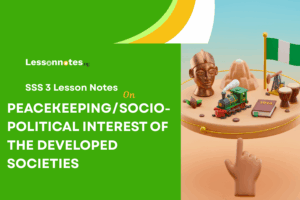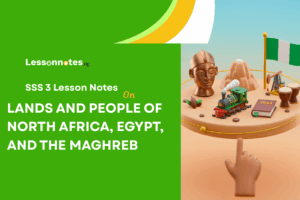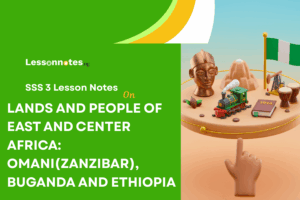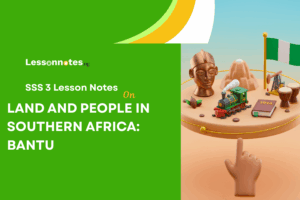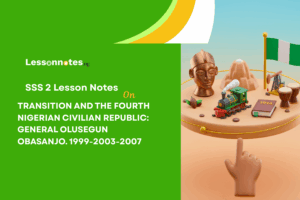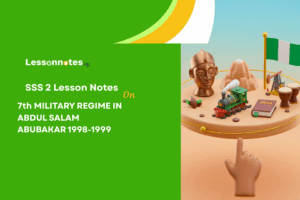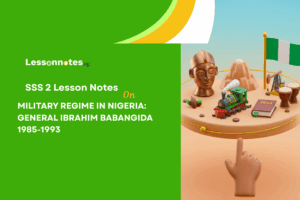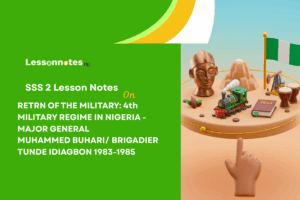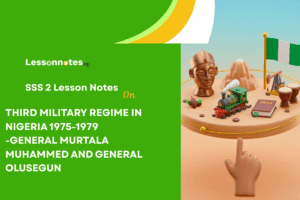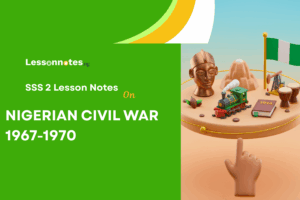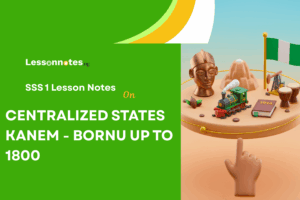THE ITSEKIRI SS1 Nigerian History Lesson Note
Download Lesson NoteTopic: THE ITSEKIRI

The Itsekiri are an important ethnic group in Nigeria. They live mainly in the western part of the Niger Delta in what is now Delta State. Though smaller in population than some other Nigerian groups, the Itsekiri have played a significant role in Nigerian history, especially in trade and cultural exchange. This lesson explores who the Itsekiri people are, where they came from, how they lived, their culture, and their place in Nigerian history.
Origins and Early History
Who Are the Itsekiri?
The Itsekiri are a distinct ethnic group with their own identity:
- They speak the Itsekiri language, which has connections to Yoruba but is a separate language
- They live mainly in the western Niger Delta, around the Benin, Escravos, and Forcados Rivers
- Their traditional homeland is in present-day Delta State, Nigeria
- They have a population of about 1 million people
- They are sometimes called “Iwere” or “Iwerre” people
- They have a rich cultural heritage spanning many centuries
- Known for their trading skills and early contact with Europeans
- Have a centralized kingdom ruled by a monarch called the Olu
- Their main city is Warri (originally called Ode-Itsekiri)
- They have a unique blend of Niger Delta and Yoruba cultural influences
Origins of the Itsekiri
Different accounts explain how the Itsekiri came to be:
- Most traditions say they are descended from a Yoruba prince from Ile-Ife
- Prince Ginuwa (or Iginuwa) is said to have left Ile-Ife around 1480
- He traveled with followers to the western Niger Delta
- They mixed with the local people they found there
- This migration created a new group with both Yoruba and Delta influences
- Archaeological evidence shows settlement in the area for many centuries
- Their language shows strong Yoruba influence but has unique features
- Their location allowed them to develop as traders between inland and coastal areas
- Some traditions also mention connections to Benin Kingdom
- Over time, they developed a distinct Itsekiri identity
The Founding of the Kingdom
The Itsekiri kingdom has its own foundation story:
- Prince Ginuwa became the first Olu (king) of the Itsekiri
- He established his capital at Ode-Itsekiri (Big Warri)
- Created a centralized kingdom with chiefs and advisors
- Set up trading networks with neighboring peoples
- Established royal traditions and ceremonies
- Started a dynasty that continues to this day
- The monarchy unified different Itsekiri communities
- Developed a court culture with elaborate rituals
- Created political structures that helped the kingdom grow
- This foundation around the 15th century gave the Itsekiri a strong start
Political and Social Organization
The Olu of Warri
The traditional ruler of the Itsekiri:
- Called the Olu of Warri (formerly Olu of Itsekiri)
- Considered a sacred ruler with divine connections
- Lived in a palace in the capital city
- Wore special regalia including coral beads
- Performed important ceremonial functions
- Made decisions with the help of chiefs
- Represented the Itsekiri to outside groups
- Came from the royal lineage descended from Ginuwa
- Had both political and religious authority
- The position continues today as an important traditional ruler
Chieftaincy System
The Itsekiri had a structured leadership system:
- Various chiefs helped the Olu govern
- Ojoye were the highest ranking chiefs
- Ologbotsere served as prime minister in some periods
- Chiefs represented different communities and interests
- Some chieftaincy titles were hereditary
- Others were awarded based on merit and achievement
- Chiefs formed a council that advised the Olu
- They helped collect taxes and settle disputes
- Represented the Olu in different areas
- This system allowed effective governance of the kingdom
Social Classes
Itsekiri society had different levels:
- The royal family at the top
- Chiefs and nobles formed the upper class
- Free citizens made up the middle class
- Servants and slaves were at the bottom
- Wealth from trade could improve social position
- Education later became another path to higher status
- Religious leaders had special positions
- Skilled craftspeople had their own status
- Women’s status usually came from their family connections
- This structure created a stable society
Family Structure
The family was the basic unit of society:
- Extended family groups lived near each other
- Patrilineal system (family line traced through fathers)
- Men could have multiple wives
- Each wife typically had her own house
- Children belonged to their father’s lineage
- Family compounds housed related people
- Elders were highly respected
- Family heads made important decisions
- Strong emphasis on kinship ties and obligations
- Marriage created alliances between families
Economic Activities
Trading Traditions
The Itsekiri were known as skilled traders:
- Located in a perfect position between inland peoples and the ocean
- Controlled river routes in the western Niger Delta
- Served as middlemen in trade networks
- Initially traded local goods like fish, salt, and crafts
- Later became intermediaries in European trade
- Developed sophisticated commercial practices
- Used various currencies including cowrie shells
- Created trading partnerships with Europeans
- Built warehouses and trading posts
- Their success in trade brought wealth and influence
European Contact and Trade
Early relationships with Europeans shaped Itsekiri history:
- Portuguese ships reached Itsekiri territory in the late 15th century
- The Itsekiri were among the first Nigerian peoples to meet Europeans
- Trade focused first on cloth, metal goods, and other items
- Later included the slave trade
- Dutch, English, and Portuguese all traded with the Itsekiri
- Some Itsekiri learned European languages for trade
- The Olu controlled access to European trade
- Christianity was introduced through these contacts
- European goods changed local material culture
- These early contacts gave the Itsekiri advantages
The Palm Oil Trade
When the slave trade ended, a new commerce emerged:
- Palm oil became the main export by the mid-19th century
- Europeans used it for soap, machine lubricants, and food
- Itsekiri traders collected oil from inland producers
- Transported it to European ships using canoes
- Traded it for imported goods like cloth, guns, and alcohol
- This trade created great wealth for some Itsekiri families
- Helped them maintain their economic power
- Built business relationships with European companies
- Required new business skills and networks
- Created competition with other Delta peoples
Fishing and Agriculture
Traditional activities remained important:
- Fishing in rivers, creeks, and the ocean
- Using canoes and various fishing methods
- Preserving fish by smoking and drying
- Growing crops like yams, cassava, and vegetables
- Cultivating fruit trees and other plants
- Palm products were harvested for local use and trade
- Kept some livestock, mainly goats and chickens
- Hunting in the forests and swamps
- Gathering useful plants and materials
- These activities provided basic food and materials
Crafts and Skills
The Itsekiri developed specialized production:
- Building large trading canoes
- Carving wood for masks, tools, and household items
- Weaving baskets and mats from local fibers
- Making pottery for storage and cooking
- Creating coral bead jewelry and regalia
- Wood and ivory carving
- Bronze and brass working
- Traditional medicine and healing
- House building adapted to the delta environment
- These crafts served both practical and cultural needs
Cultural and Religious Practices
Traditional Religion
Spiritual beliefs shaped Itsekiri life:
- Belief in a supreme creator god called Oritse
- Various lesser deities (orise) with specific functions
- Respect for ancestors who could influence daily life
- Water spirits (olokun) were especially important in the riverine environment
- Divination to understand spiritual messages
- Priests and priestesses served as intermediaries
- Shrines and sacred places throughout Itsekiri territory
- Ceremonies marked important life events and seasons
- Religious festivals brought communities together
- These beliefs provided meaning and social cohesion
Adoption of Christianity
European religion brought significant changes:
- Catholic missionaries arrived in the 16th century
- Some Olus converted to Christianity
- Dom Domingos, a Christian Olu, ruled in the early 1600s
- Later, Anglican and other denominations arrived
- Mission schools introduced Western education
- Some traditional practices continued alongside Christianity
- Others were abandoned or modified
- Created new social divisions based on religion
- Many traditional celebrations gained Christian elements
- Today most Itsekiri practice Christianity
Music and Dance
Performance arts were important in community life:
- Distinctive drumming patterns
- Various musical instruments including drums and rattles
- Songs for different occasions and life events
- Dance forms for celebrations, ceremonies, and festivals
- Masquerade performances with spiritual significance
- Music accompanied fishing, trading, and other activities
- Songs preserved history and cultural values
- Dance competitions between groups
- Professional musicians for royal ceremonies
- These arts expressed Itsekiri identity and values
Clothing and Appearance
The Itsekiri developed distinctive styles:
- Traditional clothing made from locally woven materials
- Later adopted imported cloth for special garments
- Men wore wrapped cloths and shirts
- Women wore wrapped cloths and blouses
- Coral beads showed status and wealth
- Special clothing for ceremonies and festivals
- The Olu had particularly elaborate royal attire
- Hairstyles indicated age, status, and beauty
- Body markings showed identity and protection
- Clothing styles showed both Yoruba and Delta influences
Festivals and Celebrations
Community events marked important occasions:
- Coronation ceremonies for a new Olu
- Annual festivals honoring ancestors
- Fishing festivals to ensure good catches
- Ceremonies marking birth, adulthood, marriage, and death
- Special dances and music for each occasion
- Feasts with traditional foods
- Displays of wealth and status
- Competitions in sports and games
- Religious rituals and offerings
- These celebrations strengthened community bonds
The Colonial Era and Modern Times
British Colonial Rule
European influence eventually led to colonial control:
- Initial relations were mainly commercial, not political
- British influence increased throughout the 19th century
- Competition with other Delta peoples for trade caused conflicts
- Treaty of Protection signed with the British in 1884
- Formal colonial rule began after the Berlin Conference
- The Itsekiri kingdom continued but with less power
- Traditional political structures were modified
- British officials had the final say in important matters
- The Olu and chiefs were used in indirect rule
- This system changed the nature of traditional authority
Trade Conflicts
Competition for commerce led to tensions:
- The Itsekiri competed with Urhobo, Ijaw, and others for trade
- Control of trading routes caused disputes
- The British sometimes favored certain groups over others
- The Ebrohimi War (1894) involving Chief Nana Olomu was a major conflict
- Colonial policies disrupted traditional trading patterns
- New trade routes bypassed some Itsekiri areas
- European companies took more direct control of trade
- Oil discoveries in the 20th century created new conflicts
- Competition for jobs and resources continues today
- These conflicts have shaped inter-ethnic relations in the Delta
Modern Developments
The Itsekiri have faced many changes:
- Oil and gas discovery brought development but also problems
- Environmental challenges from oil spills and pollution
- Population growth has increased pressure on resources
- Tensions with neighboring ethnic groups continue
- Political reorganization of Nigeria affected traditional boundaries
- Education has opened new opportunities
- Many Itsekiri have moved to cities throughout Nigeria
- Some have gained prominence in business, politics, and the professions
- Cultural preservation efforts are ongoing
- The Warri kingdom remains an important cultural institution
Cultural Continuity
Despite changes, Itsekiri culture continues:
- The position of Olu continues as an important traditional ruler
- Prince Tsola Emiko became the 21st Olu of Warri in 2021
- The Itsekiri language is still spoken and taught
- Traditional festivals continue with modern adaptations
- Marriage customs maintain distinctive elements
- Music and dance forms preserve cultural heritage
- Community development associations maintain connections
- Cultural revival efforts strengthen identity
- Pride in Itsekiri history and achievements remains strong
- Cultural tourism has developed around traditional practices
Notable Itsekiri Figures
Many Itsekiri have made significant contributions:
- Chief Nana Olomu – powerful 19th century trader and statesman
- Chief O.N. Rewane – nationalist and political leader
- Alfred Rewane – businessman and democracy advocate
- Fred Matrices Brume – Senator and business leader
- Professor Obaro Ikime – distinguished historian
- Sam Warri Essi – musician
- Chief Rita Lori-Ogbebor – women’s rights activist
- These individuals represent Itsekiri achievement in various fields
- Their contributions extend beyond the Itsekiri community
- They exemplify the adaptive and enterprising Itsekiri spirit.


